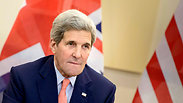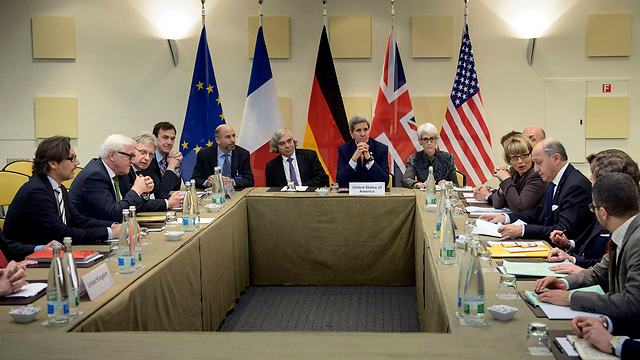
Still no nuclear deal as issues with Iran remain unresolved
2 days before deadline for high-stakes agreement, Iran denies that a deal has been reached, while the White House says it's time for the Islamic Republic to "send a clear signal" about their willingness to cooperate.
"No deal has been reached, and the remaining issues have to be resolved," the Iranian official said. Several Western diplomats have told AFP there is tentative agreement on some key parts of the emerging deal, but warned it was far from concluded.
White House press secretary Josh Earnest meanwhile told ABC: "We've been negotiating for more than a year and ultimately it's time for the Iranians to send a clear signal to the international community about whether or not they are willing to make the serious commitments required."
The comments came only two days before the deadline to reach an agreement with the P5+1 nations (the United States, Russia, China, France, Germany and Britain) over Iran's nuclear program. Recent reports from Lausanne, Switzerland, where negotiations are taking place, suggested that there had actually been progress regarding some major issues.
German Foreign Minister Frank-Walter Steinmeier on Sunday warned that the stakes in the Iran nuclear negotiations are very high and it was possible there could be further crises ahead of an end-March deadline for a preliminary deal.
"I ... cannot rule out -- and this is almost always the case with such negotiations where the stakes are high and in which we feel responsible not only to ourselves but to all the others who are not at the table -- I can't rule out that there will be further crises in these negotiations," he said.
According to sources involved with the talks, the two sides agreed on a clause allowing the Iranians to continue operating its reactor in Fordow in a limited capacity. It was said that Iran could keep 500 centrifuges at the site, in addition to the 6,000 centrifuges at the Natanz reactor.
Despite this limitation, some in Israel suspect that Iran will restrict inspection of the site and secretly contravene the agreement.
Unresolved issues include the Iranian demand to continue nuclear research and development. The six powers, France in particular, refuse. Their fear is that Iran could covertly pursue a nuclear bomb under the cover of scientific R&D.
A senior Iranian negotiator said Sunday there was no agreement yet with global powers on Iran's nuclear program, telling AFP outstanding issues had still to be dealt with.
"No deal has been reached, and the remaining issues have to be resolved," the Iranian official said. Several Western diplomats have told AFP there is tentative agreement on some key parts of the emerging deal, but warned it was far from concluded.
White House press secretary Josh Earnest meanwhile told ABC: "We've been negotiating for more than a year and ultimately it's time for the Iranians to send a clear signal to the international community about whether or not they are willing to make the serious commitments required."
The comments came only two days before the deadline to reach an agreement with the P5+1 nations (the United States, Russia, China, France, Germany and Britain) over Iran's nuclear program. Recent reports from Lausanne, Switzerland, where negotiations are taking place, suggested that there had actually been progress regarding some major issues.
German Foreign Minister Frank-Walter Steinmeier on Sunday warned that the stakes in the Iran nuclear negotiations are very high and it was possible there could be further crises ahead of an end-March deadline for a preliminary deal.
"I ... cannot rule out -- and this is almost always the case with such negotiations where the stakes are high and in which we feel responsible not only to ourselves but to all the others who are not at the table -- I can't rule out that there will be further crises in these negotiations," he said.
According to sources involved with the talks, the two sides agreed on a clause allowing the Iranians to continue operating its reactor in Fordow in a limited capacity. It was said that Iran could keep 500 centrifuges at the site, in addition to the 6,000 centrifuges at the Natanz reactor.
Despite this limitation, some in Israel suspect that Iran will restrict inspection of the site and secretly contravene the agreement.
Unresolved issues include the Iranian demand to continue nuclear research and development. The six powers, France in particular, refuse. Their fear is that Iran could covertly pursue a nuclear bomb under the cover of scientific R&D.
AFP and Reuters contributed to this report.











